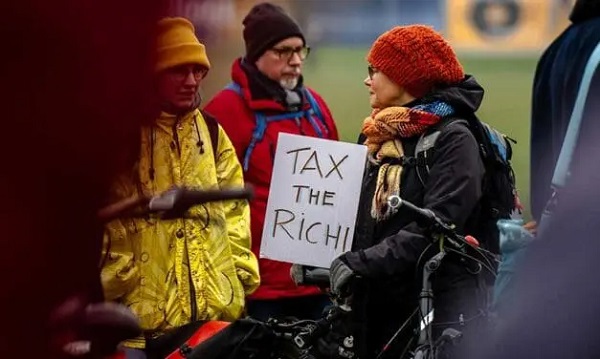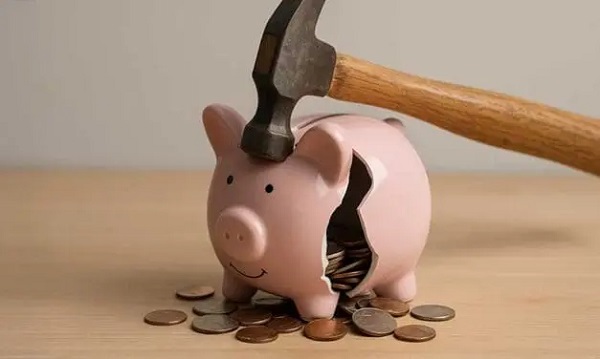2025 Federal Election
PPE Videos, CCP Letters Reveal Pandemic Coordination with Liberal Riding Boss and Former JCCC Leader—While Carney Denies Significant Meeting In Campaign

Howard Shen, a senior Liberal organizer and former president of the Jiangsu Commerce Council of Canada—now under scrutiny after Prime Minister Mark Carney falsely denied meeting the group during his January leadership campaign—is seen in a pandemic-era video delivering PPE alongside Liberal MP Majid Jowhari to the council’s president, Rui Jiang, in what appears to be a Chinese Communist Party–coordinated operation.
It is one of many concrete pieces of evidence emerging from a years-long investigation by The Bureau into the JCCC’s structure and leadership, exposing a significant overlap between this pro-Beijing business group and the Liberal Party of Canada itself.
After The Bureau first revealed that Peter Yuen, Mark Carney’s handpicked Liberal candidate to replace Paul Chiang in Markham–Unionville, had ties to pro-Beijing networks in Toronto, The Globe and Mail confirmed that Yuen held the title of honorary director of the JCCC, a group with documented links to Beijing’s United Front Work Department. The Bureau’s review of the JCCC’s activities suggests it functions as an elite platform for the Chinese Communist Party’s overseas trade messaging inside Canada.
While campaigning to replace scandal-weakened Prime Minister Justin Trudeau, Carney met with JCCC leaders during a high-profile Lunar New Year event in Toronto. The group’s website described Carney’s entry into politics as “an important turning point in the upgrading of China–Canada relations.”
But when confronted by The Globe with web posts documenting the meeting, Carney flatly denied it occurred. “I’ve never heard of this group,” he said. “Certainly didn’t have a meeting with them—I’m sorry, you can’t believe everything you read in The Globe.”
Yet internal documents, public records, Chinese-language media, and event photographs confirm that the JCCC and Liberal Party networks in the Greater Toronto Area have long shared operatives and strategic objectives—even collaborating to send PPE to United Front Work Department officials in China during the pandemic.
The Bureau, along with diaspora researchers, has assessed that the Carney meeting was significant and included JCCC leaders involved in that same United Front–coordinated PPE operation that included Liberal riding boss Howard Shen.
Perhaps most significantly, while the JCCC has listed Carney’s Markham–Unionville candidate Peter Yuen as an honorary board chair, the same riding’s senior federal executive has been Howard Shen, also the past president of the JCCC.
The Bureau has sent detailed questions to Carney, the Liberal Party of Canada, and Howard Shen. As of publication, none have responded.
Shen has fundraised for Justin Trudeau since the 2015 federal campaign in Markham, appearing with then–cabinet minister John McCallum and many Toronto-area Liberal MPs. As a riding boss, he aligned with the rise of Mary Ng, who succeeded McCallum in a 2017 by-election and was subsequently appointed to Trudeau’s cabinet.
By 2017, Shen remained a Markham-area Liberal executive while simultaneously serving as JCCC president.
That year, JCCC held the Canada–China Free Trade Agreement Forum—one of the Trudeau era’s most consequential Chinese Canadian business gatherings—advancing JCCC’s calls for deeper trade with Beijing and alignment with the Belt and Road Initiative. The forum promoted reduced reliance on the United States and featured greetings from three Liberal MPs—Mary Ng, Majid Jowhari, and Shaun Chen—alongside Chinese officials including Consul General He Wei.
Also during the pandemic, Shen and the JCCC exchanged letters with Chinese Communist Party and United Front authorities. A 2020 letter from the Jiangsu Provincial Committee of the CCP, co-signed by Party Secretary Lou Qinjian and Governor Wu Zhenglong, praised the JCCC’s donations to China.
“In these difficult times, we thank the Jiangsu Commerce Council of Canada for their support in sending protective equipment and funds to help the people of Jiangsu,” the letter stated. “We also express our deep sympathy to overseas Chinese compatriots in Canada as the pandemic situation worsens.”
The JCCC’s reply—co-signed by president Rui Jiang and Howard Shen—acknowledged that its COVID relief effort was “organized under the guidance” of Chinese Communist Party bodies including the Jiangsu Overseas Friendship Association, United Front Work Department, and Overseas Chinese Affairs Office.
“The Canadian Jiangsu Commerce Council of Canada (JCCC) is one of the most influential associations in Canada,” that letter said, adding the group had “quickly raised funds and PPEs whose combined value amounts to nearly two million yuan.”
The letter was signed by Liberal riding boss Howard Shen, as “Past President of the JCCC.”
Photographs from this period show MP Jowhari assisting with PPE deliveries at a JCCC-organized event, carrying boxes from a Toronto residence to a vehicle.
In video footage dated February 17, 2020, Shen is seen passing a fluorescent-labelled PPE box from the front door of a mansion to Jowhari, who then hands it to Rui Jiang for loading into an SUV.
The sequence—featuring three figures tied to both Liberal politics and Beijing-linked organizations—visually underscores the JCCC’s declared coordination with Chinese state bodies.
In another video filmed inside the same mansion, Shen and Jowhari—wearing the same outfits—sit beneath a Chinese flag in a wood-paneled room alongside Rui Jiang, who appears in flowered slippers. MP Jowhari discusses his government’s eagerness to provide aid to China.
“Mr. Shen is the former president of our council,” Jiang tells Jowhari. Chuckling, Jowhari replies: “Howard is the president of everyone. Howard is the glue. He’s very well connected. He understands the community, and the government.”
By this point, Shen had transitioned to Vice Chair of the Markham–Thornhill Federal Liberal Association—a position he still holds.
A separate 2020 video shows Chinese Consul General Han Tao thanking Jowhari for “his support to the Chinese community, as well as to the work of the Chinese Consul General in Toronto.” These filmed moments further reinforce Shen’s dual role as a Liberal organizer and community leader acknowledged by Chinese state officials.
Corporate records reviewed by The Bureau show that in 2012, Shen and Rui Jiang were listed as directors of a similar entity: the Jiangsu International Business Association of Canada.
In perhaps the clearest example of JCCC–Liberal Party integration, in 2017—while serving as both JCCC president and Markham riding chair—Shen led the Canada–China Free Trade Forum. The event’s final report urged Ottawa to move quickly on trade with China, avoid human rights issues, and model Canada’s approach on Australia’s FTA with Beijing.
The document positioned Chinese Canadian leaders as “go-betweens” to guide Canadian officials and framed the U.S. as a liability. “Catch the China high-speed train,” the report said, calling the Belt and Road Initiative “the new global path.”
At the time, Shen’s name appeared on both Liberal electoral filings and Chinese-language United Front publications.
Further documents link Howard Shen to the Chinese Professionals Association of Canada. On February 15, 2014, Qiu Yuanping—then Deputy Secretary-General of the CCP’s International Liaison Department—met with CPAC. Around the same time, the Markham–Unionville Federal Liberal Association was formally established, and Howard Shen became a boss of the riding for the Liberals.
Shen’s ties extended beyond Liberal Party politics. In 2011, he joined the executive board of the Canada Hefei Friendship Association alongside Wei Wei, a Markham real estate developer whose luxury mansion was later raided as an underground casino.
Peter Yuen was named the Liberal candidate in Markham–Unionville in March 2025, following the resignation of incumbent MP Paul Chiang amid controversy over foreign interference. Chiang faced mounting scrutiny after The Bureau and other outlets reported on his comments suggesting that Joe Tay—a Conservative candidate and Canadian citizen facing an illegitimate national security charge in Hong Kong—could be turned over to Chinese consular officials in Toronto. The Liberal Party’s decision to tap Yuen—a longtime Toronto police official with prior affiliations to the JCCC and events linked to the United Front Work Department—has only intensified questions, especially as Prime Minister Mark Carney attempts to distance himself from the JCCC during the ongoing federal election campaign.
The Bureau will update this breaking story with any responses from Prime Minister Carney.
The Bureau is a reader-supported publication.
To receive new posts and support my work, consider becoming a free or paid subscriber.
Invite your friends and earn rewards
2025 Federal Election
Protestor Behind ‘Longest Ballot’ Chaos targeting Poilievre pontificates to Commons Committee

Lawmakers confront organizer Tomas Szuchewycz for flooding ridings with placeholder candidates, targeting Pierre Poilievre’s seat, and wasting public resources.
Szuchewycz’s most notorious move came in Carleton — the riding of Conservative Leader Pierre Poilievre, where the ballot swelled to 91 names, stretching nearly a metre and forcing Elections Canada to redesign how it printed and handled the vote. The LBC framed the stunt as a protest against Canada’s first-past-the-post electoral system. But to most voters, it looked nothing like a principled reform campaign. What they saw was an effort aimed squarely at Poilievre, meant to bury his name among a wall of nobodies and turn the vote into a farce.
Elections Canada had to scramble to manage the chaos: printing extra‑long ballots, re‑training workers, and creating a last‑minute write‑in workaround in Battle River–Crowfoot to keep ballots usable. Seniors and disabled voters complained about the physical size and complexity of the ballot; poll workers faced new logistical headaches; public money was wasted.
At Tuesday’s hearing, Szuchewycz showed no contrition and offered no practical alternative to the system he had tried to upend. Instead, he accused MPs of having a “conflict of interest” in writing election law and demanded that power be handed to an undefined “permanent, non‑partisan body” — without explaining who would select it, how it would operate, or how it would be accountable to Canadians.
The LBC, whose actions led to metre-long ballots in ridings like Carleton (91 candidates) and Battle River–Crowfoot (86), claims to oppose Canada’s first-past-the-post system. But when asked how his proposed independent reform body would be formed, selected, or held accountable, Szuchewycz had no answers.
Conservative MP Michael Cooper led the charge, accusing Szuchewycz of overseeing a signature-harvesting scheme that involved electors signing blank nomination forms—potentially in violation of the Canada Elections Act. He tabled a January 2024 tweet and an August 2024 YouTube video showing organizers gathering signatures under the claim that candidate names would be “filled in later.”
Szuchewycz denied the accusation, claiming nomination papers had either candidate names or the phrase “all candidates” filled in. But when he tried to discredit Cooper’s evidence by calling it “AI-generated,” the committee chair issued a warning for casting doubt on the authenticity of a Member’s documents without basis. The comment was withdrawn under pressure.
Still, Cooper was unsatisfied, warning Szuchewycz that misleading Parliament could amount to contempt.
Other witnesses—experts and former elected officials—were equally critical of the LBC’s tactics. Dr. Lori Turnbull, a professor at Dalhousie University, called the stunt “undesirable” and a “waste of resources,” though she praised Elections Canada for adapting quickly by allowing a write-in workaround in Battle River–Crowfoot to avoid printing a literal wall of names.
Professor Peter Loewen of Cornell University added that the LBC’s ballot-stuffing “violates the spirit” of competitive democracy and burdens front-line elections staff with unnecessary logistical chaos. He warned that a third-party group acting like a political party without oversight was a loophole that needed closing.
Meanwhile, former Liberal MP Louis-Philippe Sauvé described the real-world toll of the stunt: longer lineups, stressed poll workers, and accessibility hurdles for elderly and visually impaired voters.
In stark contrast to these grounded critiques, Szuchewycz’s testimony revolved around vague accusations of “conflict of interest” by MPs and a call to remove Parliament from electoral reform altogether. No constitutional roadmap. No governance model. No practical enforcement mechanism.
At the end of the day, what Tomas Szuchewycz has done isn’t just a stunt, it’s an insult. He claims Canadians “know what he’s protesting,” but let’s be honest: most voters had no clue this was about electoral reform. What they saw was a campaign to flood ballots with nonsense names in key ridings, especially against the Leader of the Opposition, and create chaos for chaos’s sake.
The takeaway wasn’t a conversation about democracy. It was a spectacle, and one that mocked the very voters he pretends to represent. Lets be clear, This wasn’t activism, it was ego masquerading as principle. And it reeked of entitlement.
Tomas Szuchewycz is the embodiment of unchecked privilege: a man who hijacked our electoral process, wasted taxpayer dollars, and offered nothing in return but smug contempt for the very democracy that gave him the space to pull his stunt.
He claims Canadians understood his message. They didn’t. Most people saw a confusing mess, an attack on the Opposition Leader, and a joke made at the expense of voters, poll workers, and the electoral system itself.
So yes — reform is coming. And it can’t come soon enough.
Parliament must not just close the loopholes it should make sure that when someone deliberately sabotages the integrity of an election, they are held accountable, including being forced to repay the public for the cost of their chaos.
Because in a democracy, you have the right to protest.
But not the right to turn an election into a farce on the public’s dime.
Subscribe to The Opposition with Dan Knight
Invite your friends and earn rewards
2025 Federal Election
Post election report indicates Canadian elections are becoming harder to secure

Chief Electoral Officer Stéphane Perrault highlights strong participation and secure voting, but admits minority politics, rising costs, and administrative pressures are testing the system’s limits.
Monday in Ottawa, Stéphane Perrault, Canada’s Chief Electoral Officer, delivered a long press conference on April’s federal election. It was supposed to be a victory lap, record turnout, record early voting, a secure process. But if you listened closely, you heard something else: an admission that Canada’s election machinery is faltering, stretched thin by a system politicians refuse to fix.
Perrault touted the highest turnout in 30 years, 69 percent of eligible voters, nearly 20 million Canadians. Almost half of those ballots were cast before election day, a dramatic shift in how citizens take part in democracy.
“Twenty years ago, less than 7% voted early. This year, nearly half did,” Perrault told reporters. “Our system may have reached its limit.”
That’s the core problem. The system was built for one decisive day, not weeks of advance voting spread across campuses, long-term care homes, mail-in ballots, and local Elections Canada offices. It’s no longer a single event; it’s an extended process that stretches the capacity of staff, polling locations, and administration.
Perrault admitted bluntly that the 36-day writ period, the time between when an election is called and when the vote happens, may no longer be workable. “If we don’t have a fixed date election, the current time frame does not allow for the kind of service preparations that is required,” he said.
And this is where politics collides with logistics. Canada is once again under a minority government, which means an election can be triggered at almost any moment. A non-confidence vote in the House of Commons, where opposition parties withdraw support from the government, can bring down Parliament in an instant. That’s not a flaw in the system; it’s how parliamentary democracy works. But it leaves Elections Canada on permanent standby, forced to prepare for a snap election without knowing when the writ will drop.
The result? Sixty percent of voter information cards were mailed late this year because Elections Canada couldn’t finalize leases for polling stations on time. Imagine that, more than half the country got their voting information delayed because the system is clogged. And that’s when everything is supposedly working.
The April election cost an estimated $570 million, almost identical to 2021 in today’s dollars. But here’s the kicker: Elections Canada also spent $203 million just to stay ready during three years of minority Parliament. That’s not democracy on the cheap. That’s bureaucracy on retainer.
Perrault admitted as much: “We had a much longer readiness period. That’s the reality of minority governments.”
No Foreign Interference… But Plenty of ‘Misinformation’
Canada’s top election official wanted to make something perfectly clear: “There were no acts of foreign interference targeting the administration of the electoral process.” That’s the line. And it’s a good one… reassuring, simple, the kind of phrase meant to make headlines and calm nerves.
But listen closely to the wording. He didn’t say there was no interference at all. He said none of it targeted the administration of the vote. Which raises the obvious question: what interference did occur, and who was behind it?
Perrault admitted there was “more volume than ever” of misinformation circulating during the 2025 election. He listed the greatest hits: rumors that Elections Canada gives voters pencils so ballots can be erased, or claims that non-citizens were voting. These are hardly new — they’ve appeared in the U.S. and in Europe too. The difference, he said, is scale. In 2025, Canadians saw those narratives across more channels, more platforms, more communities than ever before.
This is where things get interesting. Because the way Perrault framed it wasn’t that a rogue actor or a foreign intelligence service was pushing disinformation. He was blunt: this was a domestic problem as much as anything else. In his words, “whether foreign or not,” manipulation of information poses the “single biggest risk to our democracy.”
Perrault insists the real danger isn’t foreign hackers or ballot-stuffing but Canadians themselves, ordinary people raising questions online. “Information manipulation, whether foreign or not, poses the single biggest risk to our democracy,” he said.
Well, maybe he should look in the mirror. If Canadians are skeptical of the system, maybe it’s because the people running it haven’t done enough to earn their trust. It took years for Ottawa to even acknowledge the obvious , that foreign actors were meddling in our politics long before this election. Endless commissions and closed-door reports later, we’re told to stop asking questions and accept that everything is secure.
Meanwhile, what gets fast-tracked? Not a comprehensive fix to protect our democracy, but a criminal investigation into a journalist. Keean Bexte, co-founder of JUNO News, is facing prosecution under Section 91(1) of the Canada Elections Act for his reporting on allegations against Liberal candidate Thomas Keeper. The maximum penalty? A $50,000 fine and up to five years in prison. His reporting, incidentally, was sourced, corroborated, and so credible that the Liberal Party quietly dropped Keeper from its candidate list.
If people doubt the system, it isn’t because they’re gullible or “misinformed.” It’s because the government has treated transparency as an afterthought and accountability as an inconvenience. And Perrault knows it. Canadians aren’t children to be scolded for asking questions, they’re citizens who expect straight answers.
But instead of fixing the cracks in the system, Ottawa points the finger at the public. Instead of rebuilding trust, they prosecute journalists.
You don’t restore faith in democracy by threatening reporters with five years in prison. You do it by showing, quickly and openly, that elections are beyond reproach. Until then, spare us the lectures about “misinformation.” Canadians can see exactly where the problem lies, and it isn’t with them.
The Takeaway
Of course, they’re patting themselves on the back. Record turnout, no servers hacked, the trains ran mostly on time. Fine. But what they don’t want to admit is that the system barely held together. It was propped up by 230,000 temporary workers, leases signed at the last minute, and hundreds of millions spent just to keep the lights on. That’s not stability. That’s triage.
And then there’s the lecturing tone. Perrault tells us the real threat isn’t incompetence in Ottawa, it’s you, Canadians “sharing misinformation.” Excuse me? Canadians asking questions about their elections aren’t a threat to democracy, they are democracy. If the government can’t handle people poking holes in its story, maybe the problem isn’t the questions, maybe it’s the answers.
So yes, on paper, the 2025 election looked like a triumph. But listen closely and you hear the sound of a system cracking under pressure, led by officials more interested in controlling the narrative than earning your trust. And when the people running your elections think the real danger is the voters themselves? That’s when you know the elastic isn’t just stretched. It’s about to snap.
-

 Business2 days ago
Business2 days agoCanada’s climate agenda hit business hard but barely cut emissions
-

 Alberta2 days ago
Alberta2 days agoAlberta Sports Hall of Fame Announces Class of 2026 Inductees
-

 Artificial Intelligence2 days ago
Artificial Intelligence2 days agoAI is accelerating the porn crisis as kids create, consume explicit deepfake images of classmates
-

 Business1 day ago
Business1 day agoCarney’s Toronto cabinet meetings cost $530,000
-

 Bruce Dowbiggin1 day ago
Bruce Dowbiggin1 day agoIntegration Or Indignation: Whose Strategy Worked Best Against Trump?
-

 Censorship Industrial Complex2 days ago
Censorship Industrial Complex2 days agoConservative MP Leslyn Lewis slams Liberal plan targeting religious exemption in hate speech bil
-

 Health2 days ago
Health2 days ago23,000+ Canadians died waiting for health care in one year as Liberals pushed euthanasia
-

 MAiD1 day ago
MAiD1 day ago101-year-old woman chooses assisted suicide — press treats her death as a social good
















